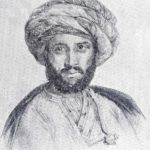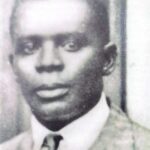COUSSEY, JAMES HENLEY
- 3 Min Read
Sir James Henley Coussey (March 10, 1895-June 6, 1958), the first African judge to be appointed straight from the Bar without becoming a colonial magistrate, gave his name to the Coussey Committee, a constitutional body appointed in 1949 of which he was chairman. The committee made recommendations which formed the basis for the 1951 constitution, which represented a major advance towards self-government for the Gold Coast.

PHOTO CAPTION: James Henley Coussey, SOURCE: EA Library
James Coussey was born in 1895 at Cape Coast. His father was Charles Louis Pierre Coussey, an agent of the trading firm of F. & A. Swanzy and Millers, a predecessor of the United Africa Company, who was partly of Senegalese and partly of Gold Coast descent. His mother was born as Amba Orba of the Aboradze clan of Anomabu, about 10 mi (16 km) east of Cape Coast.
James was educated at schools in England, returning to the Gold Coast to work as a law clerk for Thomas Hutton-Mills. He later returned to England and entered the Middle Temple to read for the Bar on June 6, 1910. He was called to the Bar on April 16, 1913, and returned home to be enrolled as a barrister of the Supreme Court on May 27, 1913.
He set up in private practice in 1913, and was the solicitor for Nana Ofori Atta I, one of whose wives’ sisters was his first wife. His practice was successful, and his name became well known in West African legal circles. He also participated in West African politics, and was a member of the National Congress of British West Africa, which held its inaugural meeting in Accra in March 1920. He was also interested in education, and served for some years on the Achimota College, Council. He was an active member of the Church of England, and for many years was Chancellor of the Accra diocese.
In 1943 he was appointed a judge of the High Court, being the second African to hold the post in the Gold Coast, the first being C. E. Woolhouse Bannerman.
After the publication of the Watson Commission’s report on the causes of the February 1948 riots, the British government decided that the Gold Coast should have a new constitution. Coussey was therefore appointed by Governor Sir Gerald Creasy (term of office 1948-49) as chairman of the Constitutional Committee which now, bears his name.
He carried out his duties admirably, and was highly commended by Arthur Creech Jones, British Secretary of State for the Colonies from 1946-50, for the manner in which he accomplished his difficult task. It was the Coussey Committee Report which formed the basis for the 1951 constitution under the provisions of which elections were held which brought the Convention People’s Party (C.P.P.) of Dr. Kwame Nkrumah to power, giving the Gold Coast internal self- government and, later, independence.
Before the Gold Coast became independent as Ghana in 1957, Coussey was a member of the West African Court of Appeal, becoming its last president before the court was abolished. He had been selected for appointment to the International Court of Justice at the Hague before his retirement from the Bench, but died before the appointment could be made.
Coussey was a highly principled patriot, but was also a shy person, who played no further part in national politics after he had concluded his task as chairman of the Constitutional Committee. He died on June 6, 1958.
L.H OFOSU-APPIAH




